Not only are these attractions fun and (shhhh) educational, they're especially magical through the eyes of a child.
Two years ago, we picked the American landmarks every kid should see, from Ellis Island to Redwood National Park. Our new and improved 2011 lineup takes that challenge even further, by highlighting how our country's top sights cater to kids' abbreviated attention spans. From roasting marshmallows around a campfire to playing dress-up at Monticello, these cool, interactive activities ensure that the younger set will enjoy these must-see spots as much as their parents do.
Grand Canyon (Ariz.)
During the day, stroll the 4-year-old Skywalk, a U-shaped, glass-bottom observation deck that juts 70 feet over the canyon's West Rim and sits 4,000 feet above the Colorado River. Come sunset, hit Grand Canyon Apache Stables, where, for $25.50 per person, you can hitch a one-hour ride on a horse-drawn wagon that ends around a campfire. Tip: BYO marshmallows and hot dogs so you can cook up a nighttime snack. Skywalk Package including mandatory Legacy pass.

The National Mall
Photo: Courtesy vicnaire/myBudgetTravel
The National Mall (D.C.)
Riding the streets of Washington, D.C., in a boat on wheels might sound cheesy, but cruising the Potomac River in one is pretty sweet. Set in a WWII-era amphibious vehicle, the 90-minute D.C. duck tour covers both land and sea. The first leg hits the history-packed National Mall—look for the 19-foot-tall Lincoln Memorial, the Capitol building, and the Smithsonian museums—and then switches to a scenic river trip. Highlight: The boat pauses at Gravelly Point, a park located just a few hundred feet from the runway at D.C.'s Reagan National Airport, so you can watch roaring planes take off and land.
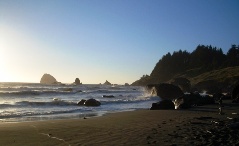
Redwood National Park
Photo: Courtesy Wikimedia Commons
Redwood National Park (Calif.)
Ancient, sky-high sequoias aren't the only attraction in this lush California locale—there's cool aquatic life, too. Take a guided tide pool tour, where budding biologists can scramble between the coastal forest's rocks while hunting for underwater creatures such as orange and purple ochre sea stars and sprawling, green anemones. Free tide pool tours are offered during the summer through Redwood National Park.

Ellis Island
Photo: Courtesy Dekoker/Wikimedia Commons
Ellis Island (N.Y.)
Between 1892 and 1924, more than 17 million immigrants passed through Ellis Island; today, their descendants account for 40 percent of Americans. Go on a hunt for your ancestors at the Ellis Island Immigration Museum, where for $5 you can search through millions of records to find the exact date your relatives sailed into the Port of New York, as well as which ship they were on and whether they traveled with other family members. (Bonus: copies of the documents are yours to keep.) And don't miss the construction of the Peopling of America Center, which cost $20 million to build and is slated to open in 2012. The new space focuses on U.S. immigration from 1955 (when Ellis Island closed) to the present, and houses interactive multimedia exhibits, like a touch screen that reflects demographic changes in American cities over time.
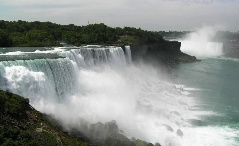
Niagara Falls
Photo: Courtesy jcjlkrebs/myBudgetTravel
Niagara Falls (N.Y.)
Sure, your grandparents honeymooned there, but the majestic waterfalls straddling the U.S.-Canada border are worth a 21st-century trip. Ever wonder what it's like to be a rubber ducky in a massive bathtub? Sign up for the Cave of the Winds tour, which begins after you change into a complimentary yellow poncho and sandals (trust us, you'll need 'em). After riding an elevator 175 feet down into the Niagara Gorge, you'll stand on the Hurricane Deck, where you'll be drenched by the tropical-storm-like spray from the 181-foot Bridal Veil Falls, where the water falls at a rate of up to 68 mph. Cave of the Winds operates May 1–Oct. 25.
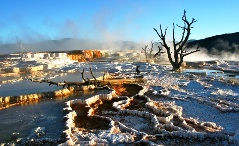
Yellowstone National Park
Photo: Courtesy mmiwig/myBudgetTravel.com
Yellowstone National Park (Wyo., Mont., and Idaho)
Snag a Young Scientist Toolkit stocked with magnifying glasses, rock samples, and stopwatches to time geyser eruptions at the Old Faithful Visitor Center and hit the great outdoors for some investigating. The coolest toy: an infrared -thermometer gun that takes readings of thermal pools when pointed at the water. And there's lots of H20: The 3,472-square-mile park is home to more geothermal features (geysers, hot springs, mud spots) than any place on earth. The Young Scientist activity booklet and toolkit costs $5 (toolkit must be returned after use).
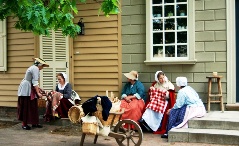
Colonial Williamsburg
Photo: Courtesy Harvey Barrison/Wikimedia Commons
Colonial Williamsburg (Va.)
Everyone in this living-history site likes to play dress-up, and visitors are no exception. At the Great Hopes Plantation—a re-creation of the town's original 1700s farm—a stash of old-timey accessories await, from tricorne (three- pointed) hats for boys and shifts and mop caps (bonnets) for girls. The costumes come in handy in the field, where kids can perform 18th-century household chores, such as picking bugs off potato crops, fetching water from the well, or hoeing the soil, that are likely to make clearing the dinner dishes seem like a breeze by comparison. Great Hopes Plantation can be accessed through regular admission tickets.
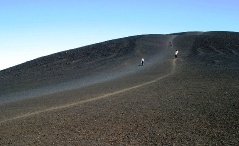
Craters of the Moon National Monument & Preserve
Photo: Courtesy Idaho Tourism
Craters of the Moon National Monument & Preserve (Idaho)
The National Park Service calls this Idaho preserve "the only officially weird park" in the country. And for good reason: The jagged, black landscape—formed by volcanic eruptions up to 15,000 years ago—boasts a 618-square-mile lava field, the biggest in the U.S. (The rocky surface is so moonlike that Apollo 14 astronauts trained at the site in 1969.) The park's most awe-inspiring feature is its lava tubes, underground passageways created by hardened molten rock. Grab a flashlight and head to Indian Tunnel, which, at 30 feet high and 50 feet wide, allows for comfortable exploring. Craving an even more intense experience? Exit the cave at the far end, a feat that requires mounting a big rock pile and squeezing through a small opening.

Independence Hall
Photo: Courtesy Dan Smith/Wikimedia Commons
Independence Hall (Penn.)
Acquaint yourself with the spirits of America's founding fathers on Philadelphia's Ghost Tour, a 90-minute, candle-lit stroll that winds past landmarks like Independence Hall, where the Constitution was adopted; the Powel House, which hosted George and Martha Washington's 20th wedding anniversary celebration; and the 238-year-old City Tavern, John Adams's former watering hole. A cape-wearing, lantern-carrying guide points out "haunted" graveyards (St. Peter's Cemetery) and reports sightings of Benjamin Franklin, who's said to roam the city's streets. The best part: All the ghost stories are based on documented accounts, which makes them all the more spooky.
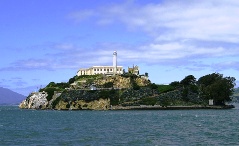
Alcatraz Island
Photo: John A. Martini/Courtesy Alcatraz Cruises
Alcatraz Island (Calif.)
Shiv collections and cramped jail cells don't exactly sound kid-friendly, but they offer a glimpse into America's most notorious island prison—and the National Park Service is all for bringing younger ones for a visit. Hop a ferry from San Francisco's Pier 33 and stroll the damp, gray halls of the maximum-security pen, which housed criminals like Al Capone and George "Machine Gun" Kelly from 1934 to 1963. (You can even get behind bars in one of the cells, if you dare.) Don't miss the audio tour, which was updated in 2007 when former inmates and guards recorded their memories of doing time at "the Rock." If you're feeling brave, take the night tour, which lets you roam the prison after dark. Alcatraz Cruises is the official carrier for tours to Alcatraz Island.
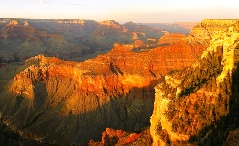



0 comments:
Post a Comment